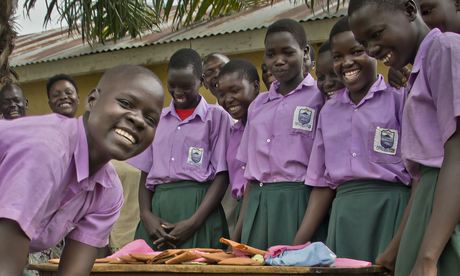Education
Source: The guardian
For many girls in Uganda, life stops when they get their period. On menstrual hygiene day, find out how one NGO is helping girls stay in school all month long.
Girls in rural Uganda miss up to eight days of study each school term because they are on their periods, a study of menstrual management in Uganda found. This was due to lack of washrooms, lack of sanitary pads and bullying by peers, focus groups with 12 to 17 year olds in 20 primary schools in five districts revealed. The eight days on average translates into 11% of the total learning days in a year. It's a school absence rate that is hard for the girl to make up for and partly accounts for girls dropping out of high school.
Most of the girls in the study said they used a piece of cloth called a kitenge which they got from their mothers, while others improvised with the cloth nappies used by their younger siblings. Some girls even used dry leaves to try to soak up the blood in emergency situations. Not only are these girls dealing with a lack of materials, they are also stigmatised by cultural attitudes that regard menstruating women and girls as dirty. Many girls grow up dreading their period because of the social stigma associated with menstruation, as well as the lack of services and facilities to help them.

Girls making reuseable sanitary pads in rural Uganda. (Photo: Derrick Debru for SNV)
"I used to use cloths that I would cut from my old T-shirts to keep the blood from staining my dresses, but they were not enough and blood would still stain my clothes," said Joan Anyango, a 16-year-old student in Ayito primary school in Lira. "Boys used to laugh at me and I eventually simply stayed home whenever my periods started."
A local NGO Caritas Lira visited Joan's school and taught her and her friends how to make reusable menstrual pads. "Now I don't get ashamed or embarrassed when I get my periods," she says. "I even attend classes during my periods and nobody notices."
Auma Milly from Lira district had to repeat a year at primary school after she missed her final exams because of her period. "When I started menstruating, I had many hard days," she says. "I could not get myself any materials to use to stop myself from soiling my clothes. It was better for me to stay at home rather than go through that shame at school."
There are many private companies that sell disposable sanitary pads in Uganda, but they are only sold in supermarkets in towns and don't reach rural areas.
A number of social enterprises have emerged to address the issue, like Afripads, making re-useable menstrual kits, Makapads that make disposal pads out of paper waste. The cost of their products is generally lower than the imported disposable pads, but they are still relatively expensive and their outreach to rural areas is limited.
To fill the gap, we at SNV, worked with Plan Uganda and Build Africa to teach girls and their parents how to make low-cost reusable menstrual pads out of soft cloths they have at home. We also involve the wider community to address cultural taboos around not discussing menstruation. Now, 200 SNV-supported schools have added making reusable pads into their art and craft and school health club activities.
But beyond teaching girls and women how to make menstrual pads, we still need to address the issues they face holistically by advocating for the provision of affordable solutions for every girl in every school as a basic right.
Ugandan female parliamentarians under the leadership of the speaker of parliament Rebecca Kadaga are leading a campaign asking the government to provide adequate washrooms and to drop taxes on sanitary pads. The Daily Monitor newspaper urges its readers to support the campaign, pointing out that Uganda's constitution includes a pledge to "provide the facilities and opportunities necessary to enhance the welfare of women to enable them realise their full potential and advancement". Sanitary towels and bathrooms seem a small price to pay for helping a girl to access a complete education.
